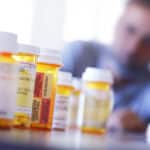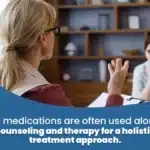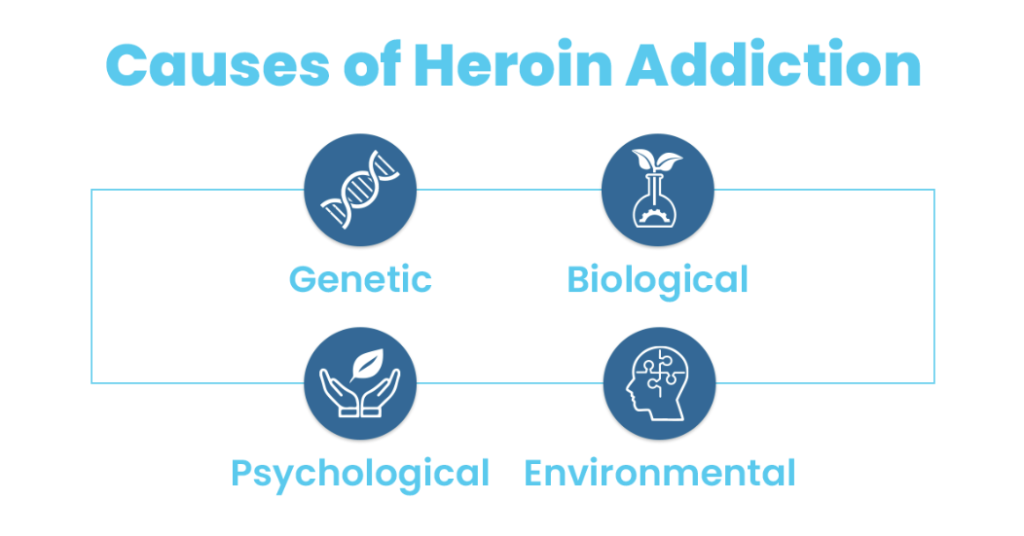
Heroin addiction is a substance use disorder (SUD) often marked by strong psychological and physical dependence. Heroin is a semi-synthetic opioid manufactured from poppy plant extracts. While heroin is illegal, many other opioids are available legally with a doctor’s prescription. No matter how a person obtains opioids, it is essential to understand that they are highly addictive and can lead to serious addiction.
In the United States, more than 13,000 individuals died from heroin overdoses, a rate of more than four deaths per 100,000 Americans. In 2020, heroin-related overdose deaths were almost seven times greater than in 1999. Nearly 20% of all opioid-related deaths involved heroin.
Therefore, due to the devastating effects of heroin addiction on different aspects of a person’s life, it is crucial to identify the signs and symptoms of heroin addiction so that this serious disorder can be identified and treated.
Causes of Heroin Addiction
While there is no one reason for heroin dependence and addiction, research on why and how some people are more vulnerable than others to developing an addiction has shown the following risk factors:
Genetics
When you have a family member who is addicted to heroin or has a history of substance misuse may imply that you are more predisposed to having addictive tendencies than individuals with no family history of substance abuse.
Biological
Another theory includes that people who develop drug addictions, such as heroin, may have brains that do not produce enough natural endorphins. A lack of endorphins in the brain might make you feel as though you need to use heroin to balance your mood.
Environmental
If you have been addicted since childhood or teen years, for example, if you grew up in a family where addiction and substance abuse are normalized, this might contribute to the view that drugs are something to turn to when stress takes over.
Psychological
When a person is addicted to heroin, coexisting mental health conditions such as bipolar disorder, anxiety, and depression are often present. Heroin may be used to hide symptoms of these problems, especially if you have not yet been diagnosed with a mental health condition.
Signs and Symptoms of Heroin Addiction
The signs and symptoms of heroin addiction differ depending on various factors, including the amount and frequency of heroin use, varying from person to person. However, the following psychological, physical, and behavioral symptoms are among the many indicators that a person may have a heroin addiction.
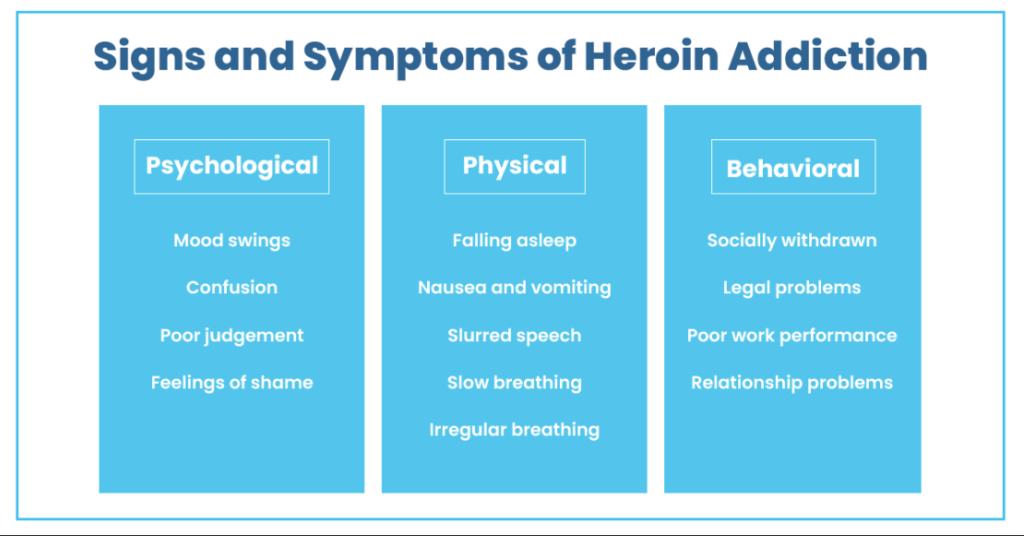
Withdrawal Symptoms of Heroin Addiction
Withdrawal happens when an individual quits using heroin or other substances after heavy or frequent usage. As the body attempts to flush out the substance, a person experiencing withdrawal may suffer various unpleasant physical and emotional symptoms. Typically, withdrawal symptoms intensify over time until the process is complete.
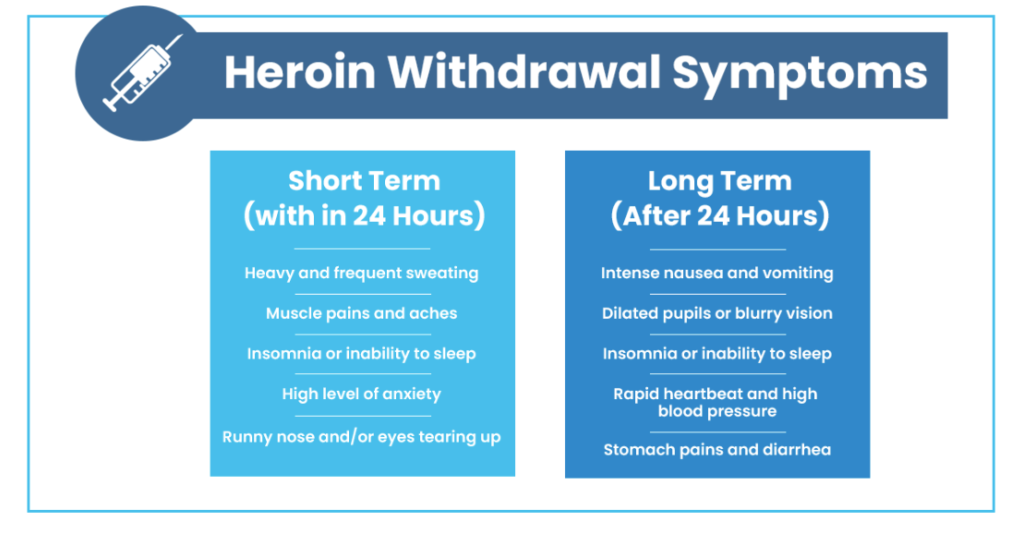
How is Heroin Addiction Diagnosed?
Any substance use disorder, including opioid use disorder, is diagnosed by a comprehensive examination and evaluation by a psychiatrist or psychologist. A professional drug and alcohol counselor may make the diagnosis in certain states.
Usually, a variety of tests are used. These include blood and urine testing as well as a clinical interview. Consult a specialist if you feel you or someone you care about has a heroin addiction. This can include licensed substance abuse counselors, social workers, physicians, and psychiatrists.
Treatment for Heroin Addiction
There is no “cure-all” for any substance addiction, including heroin addiction. Instead, effective treatments are available to assist the individual in and out of rehabilitation. Treatment of opioid use disorder is classified into pharmacological (medication) and behavioral.
Pharmacological Treatment
Those physically dependent on an opioid, such as heroin, may experience various physical symptoms during withdrawal. Some of these symptoms may be life-threatening. Included among them are nausea, vomiting, discomfort, and diarrhea.
Along with intense cravings for the substance, detoxing from heroin can be unpleasant and uncomfortable. People sometimes take heroin to alleviate the discomfort of withdrawal and detox.
As a result, medications can be used to ease cravings and physical withdrawal symptoms, decreasing the risk of heroin usage during detox.
Detoxification from the substance is typically the first step in treatment. If detox is physically intolerable, further treatment will be less successful. To improve the safety of detox, medical supervision is recommended. Your physician may recommend hospitalization for detox.
Behavioral Therapies
Numerous effective behavioral therapies for opioid dependence may be administered in outpatient and residential settings.
- Contingency management employs a voucher-based system in which patients receive “points” for negative drug tests that can be redeemed for products that promote healthy living.
- Cognitive-behavioral therapy aims to adjust the patient’s expectations and behaviors around drug usage and improve their ability to cope with various life stresses.
- The objective of dialectical behavior therapy (DBT) is acceptance and change. In treating substance use disorders, the focus is on reducing substance use and the behaviors that contribute to it, as well as promoting healthy habits that assist the individual refrain from using.
- Individual therapy might be helpful when you have depression, bipolar disorder, or any serious mental health problem that requires treatment apart from your substance use disorder.
- In motivational interviewing, therapists attempt to motivate and assist patients in maintaining their sobriety from alcohol or drugs. If you are motivated by a love for family or a desire to return to work, these issues may become the focal point of your therapy.
Frequently Asked Questions (FAQs)
What happens to your brain when you are addicted?
When a person develops an addiction, their brain receptors get loaded. The brain reacts by creating less dopamine or removing dopamine receptors, like turning down the level on a loudspeaker when the sound is too high.
What drugs release dopamine in the brain?
According to research, the most widely abused substances (including opiates, alcohol, nicotine, amphetamines, and cocaine) produce a neurochemical response that significantly increases the number of dopamine neurons produced in the brain’s reward area.
How does addiction happen?
Physical addiction appears to develop when frequent drug use alters how the brain perceives pleasure. The addictive substance changes the physical structure of some nerve cells (neurons) in the brain. Neurons interact through molecules known as neurotransmitters. These alterations may last long after drug use has stopped.
What are heroin addiction behaviors?
The heroin addiction behaviors include:
– Avoid eating
– Encounters legal, relationship, work, and school because of heroin abuse.
– Decreases in appreciating things
– Inability to maintain responsibilities
– Lack of self-control
What are some symptoms of heroin drug addiction?
The symptoms of heroin drug addiction include:
– slurred speech
– constipation
– memory problems
– depression
– reduced sense of pain
– constipation
– stress
– agitation or drowsiness
Recover From Addiction With The Haven
Opioid use disorder is a severe but curable disease. Addiction need not be permanent or even long-lasting. Help is available, and it is possible to recover.
If you or any of your family members have developed a heroin addiction, find the medical assistance you need at The Haven treatment center. We provide a complete heroin detox treatment, which is the process of removal of all traces of harmful substances from the body in a supervised and medically assisted environment.
We help our clients manage heroin withdrawal symptoms and tackle the physical aspect of their addiction. For additional information, contact us at (561) 328-8627 today!

